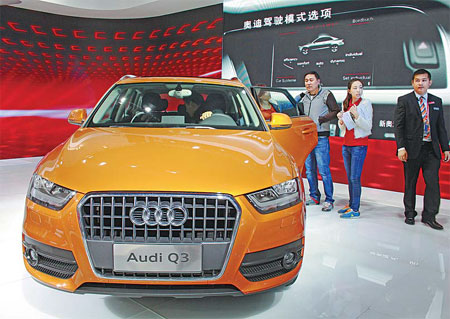Shine dims for once-golden Audi
|
After it was removed from government and military procurement lists last year, Audi said its new target market is "thinkers, creators and leaders". Shi Yan / for China Daily |
Price-fixing fine the latest setback for market leader
Once the favorite brand of officials and businessmen alike, Audi is now reconciling itself to the harsh reality that its golden days of unquestioned dominance in the Chinese premium market could be over.
The latest blow was a fine of about 249 million yuan ($40.62 million) for price fixing in early September.
For FAW-Volkswagen's Audi division it was not a massive figure in relation to the big numbers of the auto industry - it was much smaller than previous estimates - but many believe the brand's reputation has been dealt a grievous blow.
Though the final impact is hard to assess, an immediate result is that many customers are delaying plans to buy Audi vehicles.
An Audi dealer told National Business Daily that many customers are adopting a wait-and-see attitude because they feel Audi will further cut prices on vehicles and spare parts and improve after-sales services.
But that adds to the woes of many dealers that are already overstretched to meet sales goals assigned by Audi in the first six months of the year.
Statistics show 269,000 Audi vehicles were sold in the Chinese market in the first six months as its share of the premium vehicle market fell to 33.6 percent from 35.7 percent in the same period last year.
Cracks in its armor began to appear last year when it was dropped from government and military procurement lists.
Audi was one of the first international auto brands to enter China. The publicity and connections saw the first batch of Audi 100 cars sold to the government immediately after they rolled off the assembly line in the early 1990s, according to reports.
It helped Audi establish its image as an official car - an image key to its success in the private market, said auto analyst Zhang Zhiyong.
The local leadership at Audi did its best to downplay the removal from the government's purchase list, telling media it has little impact on its popularity.
Cars sold to the government account for only less than 20 percent of its total sales in China, said the executives.
Yet that meant nearly 100,000 vehicles, a figure higher than some brands' full-year sales.
And that does not include the effect its prestige image had on private car buyers.
"The top reason for at least 50 percent of customers to choose an Audi is they use it as a company car, even though they buy it in their own name," an Audi saleswoman surnamed Li told The Time Weekly.
At the 2013 Guangzhou auto show, Audi outlined its new target customers - "thinkers, creators and leaders".
But Audi is also believed to be suffering from its vague brand image as Chinese customers mature.
"It advocates technology and the future but I wonder whether such vague things can appeal to customers," said Wang Jin, a senior auto reporter at Securities Daily.
"Fans will respect Mercedes-Benz due to its history and feel BMW's passion for speed and driving pleasure. What can Audi use to attract private customers?"
He said Audi is losing the marketing race to many other premium automakers, adding both Infiniti's "Dare to Love" campaign and Volvo's emphasis on health, greenness and safety are more impressive than Audi's "Vorsprung durch Technik" - or progress through technology
Competitors
It comes as Audi's rivals continue to gain on the leader. BMW had a 23 percent growth in the Chinese market in the first half of the year and Mercedes-Benz had 36 percent. Audi registered a 17.8 increase in the period.
In addition to competitors from its home country, latecomers are also gaining traction. Infiniti sold 13,954 vehicles on the Chinese mainland in the first half of the year, a 130 percent surge year-on-year, and Volvo - now owned by Chinese automaker Geely - saw its sales reach 38,555 units, a 34 percent rise from the same period last year.
Although their sales numbers are now small, industry experts believe they pose a formidable challenge to Audi as they offer customers new choices.
"One important reason for Audi's dominance in China's premium car market is there were few brands to choose from. Now the situation has changed.
These so-called second-tier premium brands will deal a blow as heavy as, if not heavier than, BMW and Mercedes-Benz," said auto reporter Zeng Gaofei from the Legal Weekly.
"Among others, Volvo will be a major rival. It is good value for money yet has done a better job than Audi in safety".
lifusheng@chinadaily.com.cn

























